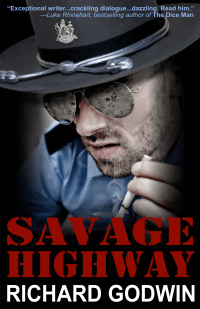 Savage Highway is about bad guys and the breakdown of law and why justice fails. In a lawless world revenge is justice. I want to discuss other authors here before I focus on the novel itself. Savage Highway is about the frontier.
Savage Highway is about bad guys and the breakdown of law and why justice fails. In a lawless world revenge is justice. I want to discuss other authors here before I focus on the novel itself. Savage Highway is about the frontier.
Both of the authors I will be discussing today portray bad guys in a variety of ways. In Burke we have the pairing of two lawless cops, Dave Robicheaux and Clete Purcell. And Purcell is an extreme example of the bad guy who is on the right side of the law. Just. Their partnership shows them tackling criminals with an extreme degree of criminality. They embody Carl Jung’s theory that great detectives have strong criminal shadows. And they live in a world peopled by bad guys. It is a Manichean world in which good and bad slug it out in seedy locations while the offender goes unpunished and revenge is lawless justice. Shane Stevens gives a different kind of portrait. His bad guys are either hoodlums fetched from the mean streets or extreme psychopaths carved out of childhood misery and the hopelessness of institutionalization. It is interesting to examine what characteristics the bad guys have and what purpose they serve dramatically. They function well in a predatory world. These are crime fictions dealing with the hard edge of crime. They are not coseys. They are realistic portraits of how criminals behave. And they depict realistically the failure of justice. In Burke the bad guy serves to show what cops need to do to catch criminals. In Stevens he is a naked example of criminality with no apologies given.
Burke has written eighteen Robicheaux novels, and many of them include the pairing of him with his partner Clete Purcell. Both are good examples of the contemporary bad guy, with Purcell being the more consistent example. He crosses the line in his hunt for criminals, and his actions are set inside the satisfaction of a revenge drama, where the criminals succeed in abusing, murdering, violating the law and exploiting the legal system for long enough to justify his actions in the mind of the reader. That is one of the dramatic purposes the bad guy serves. In different novels, Purcell fills the Cadillac of a New Orleans mobster with cement, pours Draino down a criminal’s throat, plunges a gangster head first into a toilet bowl, takes a hit out on a mobster, and beats another one and his body guard up at a petrol station and pours petrol over them while whipping his Zippo lighter alight only to be stopped dropping the flame on them by his partner Robicheaux. He abuses his liver with vodka at breakfast, falls for the wrong woman every time, wakes with a box of snakes in his head and memories of Vietnam that leave him craving a sweating Jax at dawn. He inhabits a Manichean world, one of no easy compromise. Both Robicheaux and Purcell are Vietnam veterans and their shared experience of the war is linked in many ways to Burke’s vision of the frontier in US literature. They are fighting for law on the edge of legal disorder, and their situation is a reworking of the Virgin land of Fenimore Cooper. Burke’s novels are peopled by the morally compromised, the recidivists and low lifes who fill America’s prisons. Predation runs deep and imbues the legal system and the criminal underworld it attempts to police. What the fictions I am discussing show is that the criminal food chain utilizes the inbuilt vulnerabilities of social conditioning. They also show that the bad guy is not a moral straightforward. He raises questions about our moral certainties and about bending the rules, or breaking the law for reasons the narratives he inhabits justify. Burke sets bad guy cops against the bad guy criminals in a series of fictions that show the blurred line between law and crime.
Burke’s second Robicheaux novel, Heavens’s Prisoners, 1987, recounts Robicheaux’s experiences as he tries to bring a criminal syndicate to justice on his own. The novel begins with Robicheaux rescuing a child, Alafair, the girl he adopts, from a plane wreck. His life is a precarious balance of his exacting morality as a father and husband and the ambiguous world he inhabits as a cop, as if he inhabits a tenuous world of fractured ethics. It is clear the fracture occurred in Vietnam and is ongoing in his job. Burke is careful to show what divides Robicheaux from the hard line criminals and it is his adherence to an ethic. Despite that he is more than capable of extreme violence. The following passage illustrates it clearly. When Robicheaux walks into a bar and finds one of the men who has savagely beaten him as part of the attempted block on his investigation, he crosses the line in a key scene that shows what kind of bad guy he is:
‘Most people think of violence as an abstraction. It never is. It’s always ugly, it always demeans and dehumanizes, it always shocks and repels and leaves the witnesses to it sick and shaken. It’s meant to do all these things.
I held the pool cue by its tapered end with both hands and whipped it sideways through the air as I would a baseball bat, with the same force and energy and snap of the wrists, and broke the weighted end across his left eye and the bridge of his nose. I felt the wood knock into bone, saw the skin split, saw the green eye almost come out of its socket, heard him clatter against the bar and go down on the brass rail with his hands cupped to his nose and the blood roaring between his fingers.
He pulled his knees up to his chin in the litter of cigarette butts and peanut shells. He couldn’t talk and instead trembled all over. The bar was absolutely silent. The bartender, the hookers, the oilfield workers in their hardhats, the waitresses in their pink shorts and cut-off black blouses, the rockabilly musicians, the half-dressed mulatto stripper on the dance floor, all stood like statutes in the floating layers of cigarette smoke.
I heard someone dial a telephone as I walked out into the night air.’
Robicheaux is the kind of bad guy who is fighting for moral sanity while in the grips of lacerating trauma, and witnessing not only the evisceration of his society by the mob, but also the assassination of his wife Annie by hit men who leave him with an exacting awareness of his own lack of judgement in bringing them to his home because of his own extreme measures. He also shows that the bad guy may well be on the right side in a corrupt world.
Friedrich Nietzsche discussed the tragic form as based on a dichotomy between the old Greek gods Apollo and Dionysus. In ‘The Birth of Tragedy,’ 1872, he wrote:
‘…we have considered the Apollonian and its opposite, the Dionysian, as artistic energies which burst forth from nature herself ….’
With Apollo representing law and Dionysus chaos, much crime fiction is built on a fundamental friction between the two and given the fact that the body of most crime novels consists of a criminal uprising, there is implicit within it the seductive appeal of crime.
Robicheaux is the bad guy who is fighting for justice. His partner Purcell, who occupies a tight Dionysian dialogue with him, is more extreme. Burke often sets their actions or those of his other protagonists, such as Billy Bob Holland or Sheriff Hackberry, against a wider cultural backdrop of corrupt multinational interests that occupy the dark corner of their world. Burke frequently writes of the working man victimized by the oil industry or business giants. Burke’s view is that the American psyche is being eroded by business that pollutes and uses people.
Wayfaring Stranger, 2014, exemplifies this, moving from the folk heroism of Bonnie and Clyde, to the second World War and the atrocities perpetrated by the Nazis in the name of racial purification and word domination, to a post-War America blighted by the self-serving monopolistic greed of multinational companies propped up by ideologies that while economically focused bear totalitarian traits. The protagonist, Weldon Holland, is fighting a hierarchy involving wealth and connection. Weldon Holland seeks retribution from those who use others to harm him or incarcerate his wife, a survivor of the Nazi concentration camps, in an insane asylum, and he needs the help of the hedonistic son of the very man bent on destroying him. Faced with a structure that is both impenetrable and limitlessly wealthy the working man, be it Robicheaux or Holland, is left only with his own resources and morality. Holland is an unlikely bad guy, a moral man who uses the soldier’s ethic to justify his ends. Yet besides Robicheaux and characters like Weldon Holland in the Burke canon, there is another type of bad guy and one who highlights his Manichean world with great chiaroscuro effect. One of the more corrupt characters in Wayfaring Stranger is the cop Slakely, an anti-Semite who assaults Holland’s Jewish wife. As Burke writes, and Holland narrates:
‘It’s my belief that lust, greed, and violence die hard in all of us, whether we’re Semites or Gentiles or pagans, river-baptized, born again, or redeemed by a blinding light on the road to Damascus. But there’s another group in our midst. I believe some are born with the scales and the tailed spine of the four-footed reptilian creature with which we share a common gene pool. I never bore an animus toward the average German soldier; I did, however, toward the Waffen SS, and I was glad I had killed as many of them as I possibly could. I didn’t think Slakely had twin lightning bolts tattooed under his armpit, but if he had, I’m sure he would have worn them with pride.’
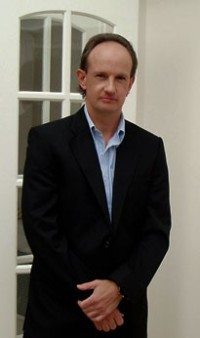
Author Richard Godwin
This is not a world of resolutions, but one of uncertainty and ongoing corruption. The stark lines Burke draws serve to exemplify both the lack of justice in society and the reasons for it. The personal reasons for criminal pathology may lie in economic deprivation or, as so often in Burke, the DNA, offering an impasse to the moralists and analysts of human motivation. The legal pathologies are represented fiercely through his ongoing portrait of police corruption and involvement with local mobsters, once again bringing it round to the money.
Shane Stevens is a different kind of writer altogether. In By Reason Of Insanity, 1979, he portrays a deviant psychopath who in many ways is the forerunner of Hannibal Lecter. Stephen King has called it ‘one of the finest novels ever written about perfect evil.’ Thomas Bishop, the protagonist, is bad and alienated and it is in many ways his alienation through the system that failed him and his upbringing that causes his killing spree across America, which sees him inhabiting another bad guy’s skin and his identity. Bishop is a killer who is the product of a failed institution. As such he represents the moral subconscious of the culture he inhabits and which enforces his criminality. Shane Stevens gives us the hard edge of crime.
It is the first serial killer novel that I know of, which examines identity and criminality in relation to upbringing and genetics. Stevens plunges the reader into a criminal anarchy that the law is unable to contain since the protagonist, the killer, is engaged in identity theft. This is also the first instance I know of in a crime novel where a criminal uses identity theft to evade the police. The idea goes to the core of criminality since the protagonist exploits others’ identities to kill.
This is a brief outline of the novel. Thomas Bishop is conceived by a woman who is convinced he is the product of a rape by real life killer Caryl Chessman. She abuses Thomas as he grows up and he kills and eats her and is sent to a mental asylum. He escapes and uses the body of a fellow inmate who resembles him, and whom he kills during the escape, to trick the police into believing he has been killed. He has got the inmate to place a scar on his body in the same place as he has done on himself as a bond. He smashes the inmate’s face in with an axe, removing his teeth with it, and making his face unrecognizable. And so the hunt for the wrong man begins.
Bishop finds identity in the assumption of others’ allowing himself a momentary ability to be who he really is. What he wants is the acknowledgement he exists. He is in pursuit of a self. The Dionysian always offers a high. It is Adam Kenton, reporter who tracks Bishop down and writes perceptively of him:
‘You want recognition? I mean real recognition? Your life story in all the papers, your face on television all over the country. Books written about you; what you eat, what you feel, what you think, what you don’t think. Maybe even a movie about you. Why not? They made movies about all the killers and maniacs I’ve mentioned, including Chessman. If that’s what you want, it’s easy. Just go out and kill some people. They don’t have to be presidents, they don’t have to be big shots. Just kill enough to make a big splash in the papers.’
The novel suggests that the media thrives on transgressions and as such Bishop is a media wired bad guy, a criminal who effectively exploits the loopholes in the system. Bishop’s high is a prolonged homicidal tour of the States. His bad guy is the extreme end of pathology, an acute example of psychopathology. He exists in the media’s representation of him as an almost cartoon character, there to scare people, just a little, while the good guys do what good guys do, catch or in this case fail to catch the villain, because he is not only protean he is nomadic, and in this way he avoids legal entrapment.
Stevens’s novel Dead City, 1973, takes a cool look at organized crime on the mean streets of New Jersey. There are plenty of bad guys in it, like Joe Zucco, boss of the family and Alex Machine who threatens to tear the city apart, like Harry Strega and Charlie Flowers who kill to order and take a savage delight in their skill. These are bad guys who are motivated by the desire for profit and criminal control, and their methods are brutal and efficient. Stephen King’s classic novel about split personality, The Dark Half, 2007, pays homage to Stevens and in particular to Alex Machine through his use of the character Alexis Machine in his own novel. King writes at the end of the novel about his decision to use the name and Stevens’s fictions:
‘I … did it as an homage to Mr Stevens, whose other novels include Rat Pack, By Reason Of Insanity and The Anvil Chorus. These works, where the so-called “criminal mind” and a condition of irredeemable psychosis interweave to create their own closed system of perfect evil, are three of the finest novels ever written about the dark side of the American dream.’
King’s conjunction of a criminal mind and psychosis is an astute description of the kind of bad guys we see here. Georges Bataille wrote in his Literature and evil, ‘Literature is not innocent, it is guilty and should admit itself so.’ His belief that literature is an act of engagement with irrational forces that are subversive and destructive is illustrated clearly in the bad guys we have encountered in Stevens, guys who do not seek moral redemption, who exist in a state of lawlessness. Unlike Robicheaux, they do not want to fight the criminal high. They all exist within a Manichean world.
Thinking of my own fictions, my bad guys tend to be more Noir. Moral compromise are two words that I often think about when writing Noir fiction. Noir the genre of losers. The genre of serial mistakes, seductions, men and women who are not necessarily criminals but are caught up in desire, and of transgressions.
Two novels that spring to mind are Mr Glamour and my latest novel Wrong Crowd. Mr. Glamour, 2012, is about a group of wealthy beautiful people who are hooked on designer goods and become the prey of a killer obsessed with brands and branding. At the centre of the investigation are two cops who both harbor criminal tendencies. DCI Jackson Flare and Inspector Mandy Steele both cross the line, with Flare violating a prisoner’s rights in pursuit of justice for a rape victim, and Steele, disturbed by what the killer is doing, entering into a dark sexual journey to allay her own sexual past which leads her to experimenting with hypoxia at the injunction of her dubious and morally compromised boyfriend. Flare is a bad guy cop, whose fight for justice is purely personal. One side of Flare’s face is deformed, the flame gun he used on the pimp was turned on him, and he bears the mark like a living reminder of his inner moral conflict that his police investigations do not resolve.
‘Flare felt the skin, the puckered flesh like a terrain of calluses against his fingertips. He moved his face one way, then the other, watching his twin selves. He often thought the unmarked side of his face was his cop face. The other side was the man he’d be if he broke the law.’
He holds no value for civilians and yet is spurred on by the need to solve crimes, as if to rescue himself. His motto may be summed up in his comment to his partner.
‘Steele people are scum.’
He is a jaded cop who sees no ethics in the people he serves, while he fights for his own in his hunt for a killer.
Wrong Crowd, 2015, is about an art thief who finds himself out of his depth in a criminal maelstrom when he meets a beautiful woman with no past. The jacket Blurb reads:
‘When Claude meets Maxine in the Caribbean he falls for her. He does not expect he will start an affair with her back in London, then again he does not expect to have to call on the help of his old mate Spike, nor that will they become embroiled with Russian gangsters Vladimir and Grigory.
But then Claude will do anything to hold onto Maxine.
Peopled with thieves, hustlers, gangsters, gun runners and pimps, Wrong Crowd is a slick and action-packed ride into London’s low-life.’
There are bad guys aplenty but the worst of all is the Russian hit man Grigory, who literally began to take over as I wrote it and delivers an extremely nasty shock in an execution scene towards the end of the novel after a series of attempted coups and come backs in the fight for turf control. His motivations are purely venal, consisting of sex, drugs, food and money.
‘Grigory boozed all night long, sniffed coke, and thought about what he’d do with the money in Russia. He left the Marriott with his case packed, and his passport in his pocket, placed the ‘Do Not Disturb’ sign on the door and drove to the lock up at 8:00AM. It was raining as he got out of his Volvo, and stared at the slate grey sky … as he pulled up the collar of his sports jacket and walked over to the lock up at the rear of the industrial area.’
Claude is a different kind of bad guy. At the centre of the novel is Claude’s obsession with Maxine, who remains detached from the other characters, while her mystique propels the action. The novel starts with Claude meeting Maxine and knowing he will never let her go, as if his identity is inextricably connected to her, as if she is urging him to be a bad guy again and get back into his old ways. In this passage from the beginning of the novel Claude thinks about his bohemian mother, and the reason she gave him his name as he looks at Maxine:
‘And he felt hungry and alone and high on her. He wanted to be able to afford her, and as he sat there he began to like his name. He realized his mother had given him a test, a signal from a romantic of what life could be. And it all became clear to him beneath the unreal Caribbean sky, as he looked at Maxine, the living fantasy who’d emerged from the waves with all his dreams alive in her hands. She couldn’t drop them now. As he craved her, Claude suddenly felt as fragile as a shard that was missing from a stained glass window.’
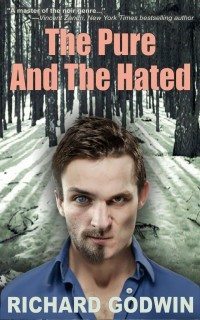
Available from WildBlue Press April 12th, 2016!
Claude is in many ways a bad guy motivated by Eros. He moves from being an art thief to a bad guy because of his sexual attraction to one woman. His motivations are physical, his acts are even more so but one step removed from the action as he hires killers for pay. We are back to moral compromise. There are many sides to the bad guy but they all have one thing in common. They are all crossing the blurred line between law and order. I believe that is one of the bad guy’s primary functions in fiction, to break down moral certainties. He may well show that the good guy is not all he is cracked up to be, or that he may be fictional.
But Savage Highway has a series of bad guys. And the forthcoming novel The Pure And The Hated even more.
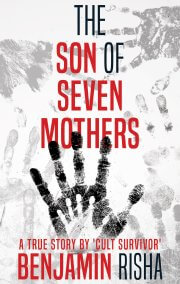

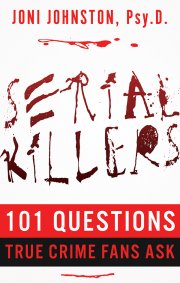
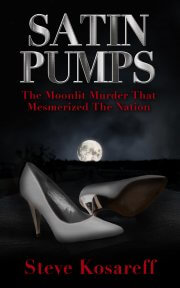
 Join our email list
Join our email list
Leave a Reply